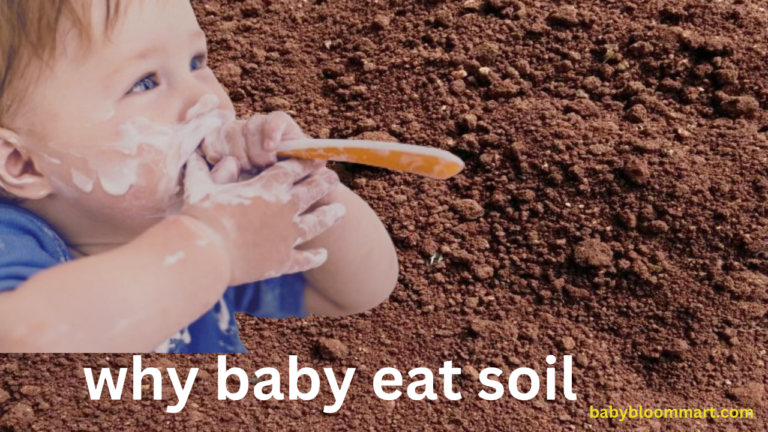As parents, we often find ourselves puzzled by the curious behaviors of our little ones. One such perplexing habit is when a baby eats soil. This behavior, while alarming, is surprisingly common among infants and toddlers. In this blog post, we will explore why babies eat soil, address related concerns, and provide guidance on how to ensure your child’s safety and well-being.

Why Baby Eat Soil:
The behavior of eating non-food items, such as soil, is known as pica. Pica is relatively common in young children and can be attributed to various factors:
- Exploration: Babies explore their environment through their senses, including taste. Eating soil might simply be a part of their natural curiosity as they learn about the world around them.
- Nutrient Deficiencies: In some cases, pica may be linked to deficiencies in essential nutrients like iron, zinc, or calcium. The body might crave non-food items to compensate for these deficiencies.
- Oral Development: The urge to chew and put things in their mouth is part of oral development. Soil, like other objects, might just be another item they encounter.
- Behavioral and Psychological Factors: Some children might develop pica due to behavioral or psychological reasons. Stress, anxiety, or a need for attention could trigger such behavior.
Is It Harmful for Babies to Eat Soil? While eating soil might seem harmless, it can pose several health risks, including:
- Ingesting Harmful Substances: Soil can contain harmful bacteria, parasites, pesticides, or toxic substances like lead. Ingesting contaminated soil can lead to infections or poisoning.
- Choking Hazard: Small stones or debris in the soil can pose a choking risk.
- Gastrointestinal Issues: Eating soil can cause gastrointestinal upset, including nausea, vomiting, or diarrhea.
How to Prevent and Address Soil Eating: To keep your baby safe and discourage soil eating, consider the following steps:
- Supervise Outdoor Play: Always supervise your baby during outdoor play to prevent them from eating soil or other non-food items.
- Provide Safe Alternatives: Offer safe, age-appropriate toys and teething objects to satisfy their oral exploration needs.
- Ensure a Balanced Diet: Ensure your child receives a well-balanced diet rich in essential nutrients. Consult your pediatrician about potential deficiencies and appropriate supplements if needed.
- Create a Safe Play Area: Designate a safe, clean play area free from accessible soil or dirt.
- Educate and Distract: Gently educate older toddlers about the dangers of eating non-food items and distract them with engaging activities or snacks.
Why do babies put everything in their mouth?
Babies put objects in their mouth as part of their natural developmental process. This behavior helps them explore textures, shapes, and tastes while also soothing their gums during teething. It’s a crucial way for them to learn about their environment.
When should we worry about the baby eating non-food items?
While occasional mouthing of non-food items is normal, persistent pica behavior that continues beyond 18-24 months, or is accompanied by other symptoms like gastrointestinal issues or developmental delays, warrants a consultation with a pediatrician. It can be an indicator of a deeper health issue that requires attention.
How can I tell if my baby has a nutrient deficiency?
Signs of nutrient deficiencies can vary but may include unusual cravings (like pica), fatigue, irritability, pale skin, or slow growth. If you suspect a deficiency, consult your pediatrician for proper evaluation and testing.
Are there any long-term effects of pica in babies?
Most children outgrow pica as they develop better ways to explore their environment and improve their nutritional status. However, persistent pica can lead to health complications if not addressed. Long-term effects are generally associated with the ingestion of harmful substances or chronic deficiencies.
Understanding why babies eat soil can help parents take the necessary steps to ensure their child’s safety and well-being. While this behavior is often a normal part of development, it is essential to monitor and address any potential health risks. By providing a safe environment, balanced nutrition, and appropriate guidance, you can help your baby navigate this curious phase safely and healthily. If you have concerns, always consult your pediatrician for personalized advice and support.